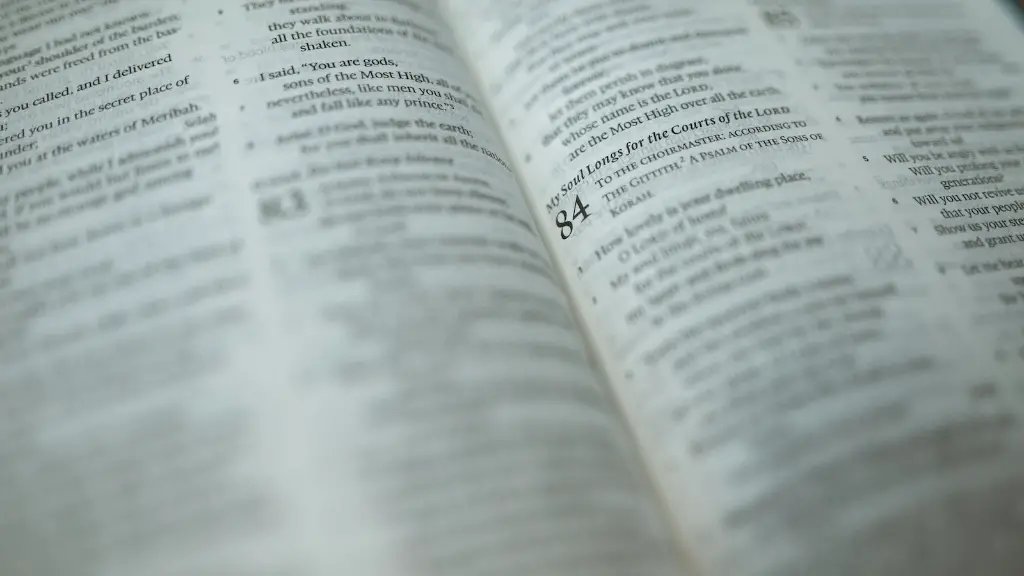The Bible is one of the most sacred texts in human history, and it is often cited as a guide for moral and ethical decision-making. However, some believe there is a disconnect when it comes to homosexuality and the Bible. Despite some churches accepting LGBT individuals and same-sex marriage, some cite Bible verses that appear to be critical of homosexuals. To what extent is being gay against the Bible, and what do Bible verses show?
Understanding how to interpret the Bible is often a subjective process. In general, those who reject the notion of being gay as sinful believe that the Bible’s verse on the subject must be read in the particular cultural and historical context in which they were written. This means that the words of biblical authors and translators must be thoughtfully interpreted. For example, some believe that the New Testament Greek language does not have a word for “homosexual” and that “homosexuality” is an invention of modern society. Furthermore, some note that the Bible does not mention same-sex marriages and therefore does not condemn them.
Theologians have also argued that Jesus himself says nothing about same-sex behavior and relationships, and therefore, it is impossible to be certain what the Bible says about the issue. They note that Jesus’ teachings focus on themes of love, compassion, and justice, which suggests that he would have accepted and embraced same-sex relationships if they did exist in his time. Similarly, some argue that Christianity’s emphasis on personal prayer and individual interpretation of Scripture makes it possible to open a dialogue on homosexuality and the Bible.
Moreover, some believe that it is not the act of same-sex relationships that is sinful, but the social prejudice and lack of acceptance that are wrong. As such, they argue that the Bible’s words must be weighed in light of the overall message of love and compassion that the Bible conveys. For example, some point out that Jesus instructs his followers to love their neighbor as themselves and to not judge others, which suggests a potential rejection of the idea that same-sex behavior is wrong.
Ultimately, the Bible does not provide a clear answer as to whether same-sex behavior is wrong or not, and for some, this presents an opportunity for both sides to engage in an open dialogue about their views and beliefs.
The Relationship Between The Bible and the Church
The relationship between the Bible and the Church has changed over time. For example, the Church has often misinterpreted Biblical passages or ignored certain verses relevant to same-sex relationships. This can be seen in the Church’s opposition to same-sex marriage and LGBT individuals.
Some argue that the Church’s views do not necessarily reflect the Bible’s teachings. For example, although the Bible does not explicitly condone same-sex behavior, it does not completely condemn or rule out the possibility of platonic same-sex relationships. As such, those who reject the Church’s views may view various verses of the Bible as being more inclusive to same-sex relationships than currently understood.
Moreover, some point out that the Bible can be interpreted in different ways. For example, when Jesus commands his followers to love their neighbor as themselves, some may interpret this passage as being more inclusive to same-sex relationships than the Church’s stance might suggest. Furthermore, some people suggest that the Bible can be seen as a living document that can be read in a way that is relevant to the current cultural context.
Ultimately, the relationship between the Bible and the Church is complex, and it is often difficult to determine what the Bible actually says about same-sex relationships. On one hand, some reject the Church’s stance and instead interpret the Bible in a more inclusive way. On the other hand, the Church’s views on LGBT issues may not always be in line with the Bible’s teachings.
The LGBT Community and Social Justice
The LGBT community has faced discrimination and marginalization throughout history. In many places, laws have been passed that criminalize or restrict same-sex relationships, and these laws have often been justified by citing the Bible.
However, some argue that the Bible does not necessarily provide a clear answer to this issue, and that the Bible can be interpreted in a more inclusive way. As such, those who reject the Church’s stance may call for social justice measures that protect and support LGBT individuals and same-sex relationships. They may point out that the Bible’s main message is one of love and compassion and that this message can be interpreted in a way that is more inclusive to LGBT individuals.
In particular, some argue that being gay is not a choice and that LGBT individuals should not be discriminated against simply for being who they are. As such, they may call for laws that protect LGBT people from discrimination and hate crimes and that allow them to have the same rights and freedoms as everyone else. Furthermore, some may call for wider acceptance of LGBT people and a shift away from negative stereotypes that have been perpetuated over time.
Ultimately, the issue of being gay and the Bible is complex. Although some interpret the Bible as condemning same-sex behavior, others point out that the Bible’s overall message is one of love and compassion and can be read in a way that is more inclusive to LGBT individuals. Furthermore, some believe that laws and social attitudes should be shifted in order to protect the rights of LGBT people.
The Impact of the Bible On LGBT Rights
The Bible has had a significant impact on the discussion surrounding same-sex relationships and LGBT rights. As noted earlier, some individuals and organizations cite the Bible as a source of moral and ethical guidance and as justification for their opposition to same-sex behavior. As such, the Bible can be seen as having a negative influence on the rights of LGBT individuals.
On the other hand, some have argued that the Bible can be interpreted in a more inclusive way, and that its teachings should lead us to embrace and protect the rights of LGBT individuals. For example, some believe that Jesus’ commandment to love one’s neighbor as oneself is applicable to all individuals, regardless of sexual orientation or gender identity. As such, they may point out that the Bible can be used to advocate for greater acceptance and protection of LGBT people.
Furthermore, some have argued that religion and faith can be used to support LGBT rights. For example, many churches have changed their views on same-sex marriage and are now more accepting of LGBT individuals. Similarly, many faith-based organizations support LGBT rights and advocate for the protection of LGBT individuals.
Ultimately, the Bible can be seen as both a source of negative influence and positive change when it comes to LGBT rights. To some, it is a source of moral and ethical guidance, while to others, it is a source of inspiration and hope.
The Long-Term Effects of the Debate
The debate over being gay and the Bible has had long-term implications for the LGBT community. For example, laws that criminalize same-sex relationships in many countries have been justified by citing various passages from the Bible. As such, these laws have had a profound effect on the lives of LGBT people in those countries.
Moreover, the debate has also had an effect on attitudes towards LGBT people in some countries. Although attitudes are slowly changing, discrimination and prejudice against the LGBT community remain in many places. Furthermore, the debate has also had an effect on the way individuals and organizations view LGBT people.
Ultimately, the debate over being gay and the Bible has had profound implications for the LGBT community. Although attitudes are slowly changing and many organizations are now advocating for the protection of LGBT rights, the debate has had a lasting effect on the rights and freedoms of LGBT people.
What the Bible Shows Us
The Bible, like any other sacred text, is open to many interpretations and opinions. Although it is often cited as a source of moral and ethical guidance, many believers have different views on its relevance and applicability to the LGBT community.
On one hand, some cite certain passages as evidence that homosexuality is sinful. On the other hand, others interpret the Bible in a more inclusive way, and point out that many of Jesus’ teachings center around themes of love and compassion, which may suggest a more open view of same-sex relationships.
Ultimately, the Bible provides resources on which individuals can draw upon to form their own views. Some may accept the Church’s view that same-sex behavior is sinful, while others may interpret the Bible in a way that is more accepting and inclusive of LGBT individuals.
Conclusion
Ultimately, the issue of being gay and the Bible is complex and controversial. Although some believe homosexuality is sinful and cite Bible verses as evidence, others interpret the Bible in a more inclusive way. Furthermore, the Bible has had a profound effect on the rights of LGBT individuals, and attitudes are slowly changing as more organizations advocate for LGBT rights. Ultimately, it is up to individuals to decide how they interpret the Bible and how they view the LGBT community.





